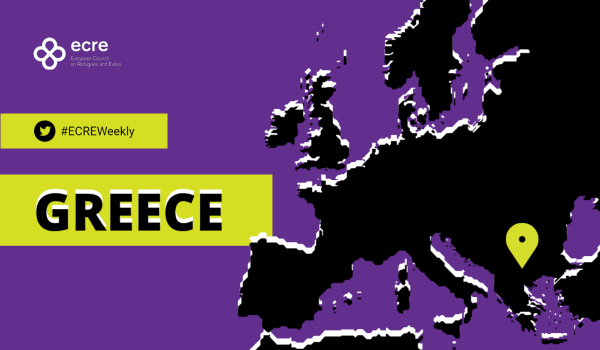In a joint letter, 27 civil society organisations call for EU action over Greece’s systematic non-compliance with the Asylum Procedures Directive (APD) as regards the safe third country concept. A joint operation by the Hellenic Coast Guard and the European Border and Coast Guard Agency Frontex has prevented 120 people from reaching safety in Greece. While regular reception remains dire, people fleeing Ukraine are granted access to housing, medical care and work.
ECRE and several members are amongst the 27 civil society organisations that have signed a joint letter drafted by Refugee Support Aegean (RSA) urging European Commissioner for Home Affairs, Ylva Johansson: “to promptly take the necessary measures against Greece to ensure effective compliance with Article 38(4) of the APD”. This article establishes the obligation of member states to “ensure that access to a procedure is given in accordance with the basic principles and guarantees”, when a third country does not permit an applicant to enter its territory. Turkey never applied the third country clause of the EU-Turkey Readmission Agreement, suspended the Greece-Turkey Bilateral Readmission Protocol in 2018, and readmissions under the EU-Turkey Statement in March 2020. However, Greek asylum authorities arbitrarily deem Turkey a “safe third country” for applicants from Syria, Afghanistan, Somalia, Pakistan and Bangladesh: “leading to a large number of applicants having their claims dismissed as inadmissible and being ordered to return to Turkey, without any prospects of such a readmission”. On 1 March, Khaled, a Syrian national who has had several applications dismissed based on Turkey being a safe-third country, submitted a complaint to the European Commission for violations of EU asylum law and of his fundamental rights by Greece. A policy note published by RSA on 10 March reveals that the number of “inadmissibility decisions – without an assessment of the merits of applications – based on the “safe third country” concept jumped from 2,839 in 2020 to 6,424 in 2021”.
In a press release from 4 March the Hellenic Coast Guard reported 120 people attempting to enter Greek territorial waters in five incidents with none of them succeeding and all later picked up by Turkish authorities. While, according to the press release both the coast guard and Frontex forces were present and managing the situations it does not offer insights as to their respective roles. According to a researcher, the joint operation is: “blurring the boundaries between ‘prevention of entry’ and pushbacks”. On 1 March the Hellenic Coast Guard found the bodies of three men and three women believed to be migrants on the coast of Lesvos, close to island main town of Mytilene. Reportedly, two of the bodies were discovered in the sea while another four had washed up on the beach. None were wearing lifejackets and the coast guard found no survivors or signs of a shipwreck.
A new report from ECRE member Greek Council for Refugees (GCR) and Oxfam points to “de facto detention, revenge tactics and despair” in the new migration centre on Samos. The facility is one of five EU funded closed controlled facilities in the Aegean hotspots. Based on testimonies, the organisations conclude that detention, declared illegal by a Greek court in a case from December 2021, remains “very much a reality” with one in five camp residents in de facto detention for two months. Further, the report finds that asylum seekers face “revenge tactics” if they take legal action, including “early morning raids, unexplained transfers to the police station, and oral eviction notices to residents appealing a negative asylum decision”. All residents are also subject to excessive surveillance including CCTV monitoring. A report from Refugees International points to “increasingly restrictive and securitized settings” for asylum seekers both the islands and mainland. The report describes how people are “confined and marginalized instead of welcomed”.
While the PHILOS Emergency Health Response to Refugee Crisis program – that ensures health care access for thousands of asylum seekers and migrants – was only extended after political pressure, Greece has been quick to offer access to medical care to people fleeing Ukraine. On 6 March the Ministry of Asylum and Migration announced that Ukrainians would benefit from automatic one-year temporary protection, a status that enables access to housing and work in Greece. Some 25,000 Ukrainians are already residing in the country. On 11 March, roughly 7,000 people Ukrainians have arrived since the Russian invasion, some to join family members. More than 10,000 people fleeing Ukraine are reportedly gathered at the border with Romania with the majority planning to attempt to reach Greece. Arrivals via Bulgaria are also continuing. The Ministry of Migration and Asylum has stated Greece can accommodate 30,000 people from Ukraine . The government has talked of available capacity in migrant camps in the north of the country and says 140,000 jobs in the agriculture sector and some 50,000 in tourism would be open to Ukrainians.
For further information:
- ECRE, Greece: Pushbacks Face Renewed International, Legal, Political, and Public Scrutiny, Turkey Conducts Large-Scale Returns, Coast Guard Seeks to Purchase Surveillance Software, February 2022
- ECRE, Greece: Aegean Sea Unmonitored as Crackdown on Civil Society Continues, New Violent Pushbacks Amid Collective Deportations from Turkey to Syria, New Lesvos Camp in High Risk Area, February 2022
This article appeared in the ECRE Weekly Bulletin. You can subscribe to the Weekly Bulletin here.

